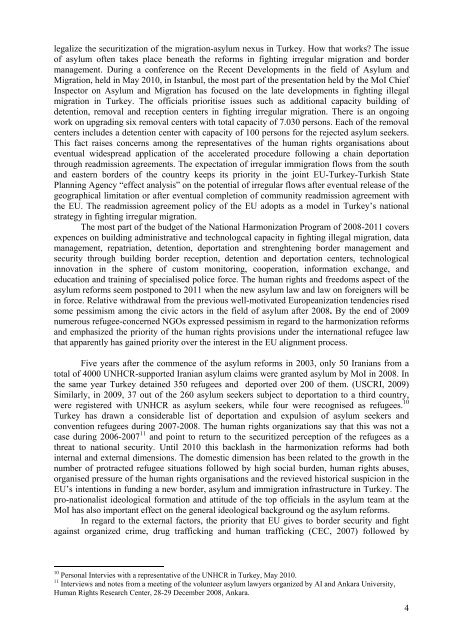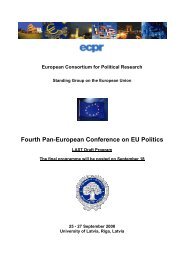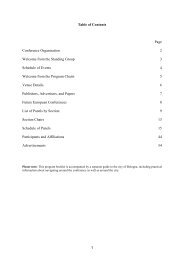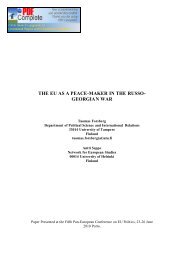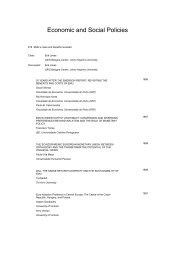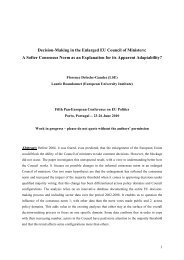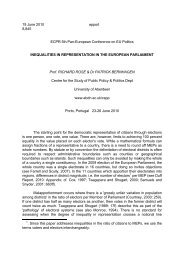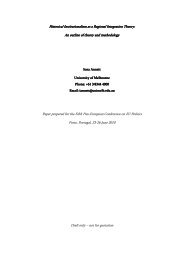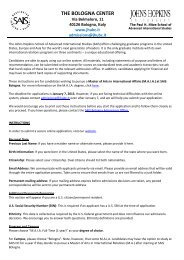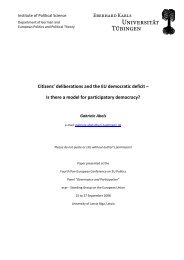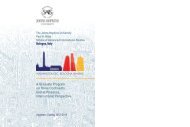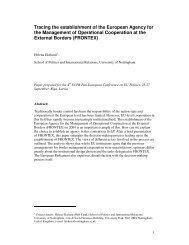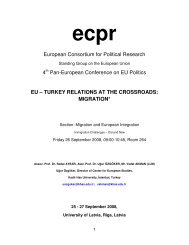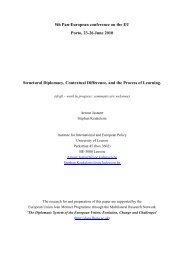1 “Building “Fortress Turkey”: Europeanization of Asylum Policy in ...
1 “Building “Fortress Turkey”: Europeanization of Asylum Policy in ...
1 “Building “Fortress Turkey”: Europeanization of Asylum Policy in ...
You also want an ePaper? Increase the reach of your titles
YUMPU automatically turns print PDFs into web optimized ePapers that Google loves.
legalize the securitization <strong>of</strong> the migration-asylum nexus <strong>in</strong> Turkey. How that works? The issue<br />
<strong>of</strong> asylum <strong>of</strong>ten takes place beneath the reforms <strong>in</strong> fight<strong>in</strong>g irregular migration and border<br />
management. Dur<strong>in</strong>g a conference on the Recent Developments <strong>in</strong> the field <strong>of</strong> <strong>Asylum</strong> and<br />
Migration, held <strong>in</strong> May 2010, <strong>in</strong> Istanbul, the most part <strong>of</strong> the presentation held by the MoI Chief<br />
Inspector on <strong>Asylum</strong> and Migration has focused on the late developments <strong>in</strong> fight<strong>in</strong>g illegal<br />
migration <strong>in</strong> Turkey. The <strong>of</strong>ficials prioritise issues such as additional capacity build<strong>in</strong>g <strong>of</strong><br />
detention, removal and reception centers <strong>in</strong> fight<strong>in</strong>g irregular migration. There is an ongo<strong>in</strong>g<br />
work on upgrad<strong>in</strong>g six removal centers with total capacity <strong>of</strong> 7.030 persons. Each <strong>of</strong> the removal<br />
centers <strong>in</strong>cludes a detention center with capacity <strong>of</strong> 100 persons for the rejected asylum seekers.<br />
This fact raises concerns among the representatives <strong>of</strong> the human rights organisations about<br />
eventual widespread application <strong>of</strong> the accelerated procedure follow<strong>in</strong>g a cha<strong>in</strong> deportation<br />
through readmission agreements. The expectation <strong>of</strong> irregular immigration flows from the south<br />
and eastern borders <strong>of</strong> the country keeps its priority <strong>in</strong> the jo<strong>in</strong>t EU-Turkey-Turkish State<br />
Plann<strong>in</strong>g Agency “effect analysis” on the potential <strong>of</strong> irregular flows after eventual release <strong>of</strong> the<br />
geographical limitation or after eventual completion <strong>of</strong> community readmission agreement with<br />
the EU. The readmission agreement policy <strong>of</strong> the EU adopts as a model <strong>in</strong> Turkey’s national<br />
strategy <strong>in</strong> fight<strong>in</strong>g irregular migration.<br />
The most part <strong>of</strong> the budget <strong>of</strong> the National Harmonization Program <strong>of</strong> 2008-2011 covers<br />
expences on build<strong>in</strong>g adm<strong>in</strong>istrative and technologcal capacity <strong>in</strong> fight<strong>in</strong>g illegal migration, data<br />
management, repatriation, detention, deportation and strenghten<strong>in</strong>g border management and<br />
security through build<strong>in</strong>g border reception, detention and deportation centers, technological<br />
<strong>in</strong>novation <strong>in</strong> the sphere <strong>of</strong> custom monitor<strong>in</strong>g, cooperation, <strong>in</strong>formation exchange, and<br />
education and tra<strong>in</strong><strong>in</strong>g <strong>of</strong> specialised police force. The human rights and freedoms aspect <strong>of</strong> the<br />
asylum reforms seem postponed to 2011 when the new asylum law and law on foreigners will be<br />
<strong>in</strong> force. Relative withdrawal from the previous well-motivated <strong>Europeanization</strong> tendencies rised<br />
some pessimism among the civic actors <strong>in</strong> the field <strong>of</strong> asylum after 2008. By the end <strong>of</strong> 2009<br />
numerous refugee-concerned NGOs expressed pessimism <strong>in</strong> regard to the harmonization reforms<br />
and emphasized the priority <strong>of</strong> the human rights provisions under the <strong>in</strong>ternational refugee law<br />
that apparently has ga<strong>in</strong>ed priority over the <strong>in</strong>terest <strong>in</strong> the EU alignment process.<br />
Five years after the commence <strong>of</strong> the asylum reforms <strong>in</strong> 2003, only 50 Iranians from a<br />
total <strong>of</strong> 4000 UNHCR-supported Iranian asylum claims were granted asylum by MoI <strong>in</strong> 2008. In<br />
the same year Turkey deta<strong>in</strong>ed 350 refugees and deported over 200 <strong>of</strong> them. (USCRI, 2009)<br />
Similarly, <strong>in</strong> 2009, 37 out <strong>of</strong> the 260 asylum seekers subject to deportation to a third country,<br />
were registered with UNHCR as asylum seekers, while four were recognised as refugees. 10<br />
Turkey has drawn a considerable list <strong>of</strong> deportation and expulsion <strong>of</strong> asylum seekers and<br />
convention refugees dur<strong>in</strong>g 2007-2008. The human rights organizations say that this was not a<br />
case dur<strong>in</strong>g 2006-2007 11 and po<strong>in</strong>t to return to the securitized perception <strong>of</strong> the refugees as a<br />
threat to national security. Until 2010 this backlash <strong>in</strong> the harmonization reforms had both<br />
<strong>in</strong>ternal and external dimensions. The domestic dimension has been related to the growth <strong>in</strong> the<br />
number <strong>of</strong> protracted refugee situations followed by high social burden, human rights abuses,<br />
organised pressure <strong>of</strong> the human rights organisations and the revieved historical suspicion <strong>in</strong> the<br />
EU’s <strong>in</strong>tentions <strong>in</strong> fund<strong>in</strong>g a new border, asylum and immigration <strong>in</strong>frastructure <strong>in</strong> Turkey. The<br />
pro-nationalist ideological formation and attitude <strong>of</strong> the top <strong>of</strong>ficials <strong>in</strong> the asylum team at the<br />
MoI has also important effect on the general ideological background og the asylum reforms.<br />
In regard to the external factors, the priority that EU gives to border security and fight<br />
aga<strong>in</strong>st organized crime, drug traffick<strong>in</strong>g and human traffick<strong>in</strong>g (CEC, 2007) followed by<br />
10 Personal Intervies with a representative <strong>of</strong> the UNHCR <strong>in</strong> Turkey, May 2010.<br />
11 Interviews and notes from a meet<strong>in</strong>g <strong>of</strong> the volunteer asylum lawyers organized by AI and Ankara University,<br />
Human Rights Research Center, 28-29 December 2008, Ankara.<br />
4


